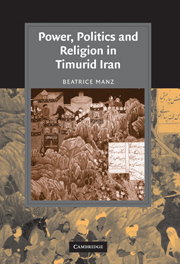Book contents
- Frontmatter
- Contents
- List of maps
- Preface
- Chronology
- Family tree of major Timurid princes
- Introduction
- 1 The formation of the Timurid state under Shahrukh
- 2 Issues of sources and historiography
- 3 Shahrukh's dīwān and its personnel
- 4 Political and military resources of Iran
- 5 Timurid rule in southern and central Iran
- 6 Political dynamics in the realm of the supernatural
- 7 The dynasty and the politics of the religious classes
- 8 The rebellion of Sultan Muhammad b. Baysunghur and the struggle over succession
- Conclusion
- Bibliography
- Index
- Cambridge Studies in Islamic Civilization
7 - The dynasty and the politics of the religious classes
Published online by Cambridge University Press: 17 July 2009
- Frontmatter
- Contents
- List of maps
- Preface
- Chronology
- Family tree of major Timurid princes
- Introduction
- 1 The formation of the Timurid state under Shahrukh
- 2 Issues of sources and historiography
- 3 Shahrukh's dīwān and its personnel
- 4 Political and military resources of Iran
- 5 Timurid rule in southern and central Iran
- 6 Political dynamics in the realm of the supernatural
- 7 The dynasty and the politics of the religious classes
- 8 The rebellion of Sultan Muhammad b. Baysunghur and the struggle over succession
- Conclusion
- Bibliography
- Index
- Cambridge Studies in Islamic Civilization
Summary
For people among the religious classes, the dynasty and court circle were only one factor in advancement; they could influence, but not manage, the traditional structures of authority. The ruler might promote a specific school or tendency, but one cannot assume that he could successfully implement a program of his own. Even among those who held recognized positions – the ulama, Sufi shaykhs, and the ruler himself – religious authority was diffuse and amorphous. When we follow the lives of individuals we find that neither the formal institutions of mosque and madrasa nor the Sufi ṭarīqas seem to have defined the lives of their members. Lines of alliance, loyalty and communication went across categories of all kinds, and created a space in which individuals could pursue their own careers and come to individual accommodations with government and society.
Shahrukh was one of numerous actors in the religious sphere and had to respect the status of many influential groups. As a rich capital city, Herat became a magnet for both scholars and Sufis. Probably the most prestigious ulama were the children and students of the scholars whom Temür had brought to favor. Under the Kartids, Herat had been a center of culture, and we find some personnel under Shahrukh whose antecedents go back to the ulama fostered by them. Besides scholars connected to the mosques and madrasas of the capital, there were local families who inherited religious prestige.
- Type
- Chapter
- Information
- Power, Politics and Religion in Timurid Iran , pp. 208 - 244Publisher: Cambridge University PressPrint publication year: 2007



